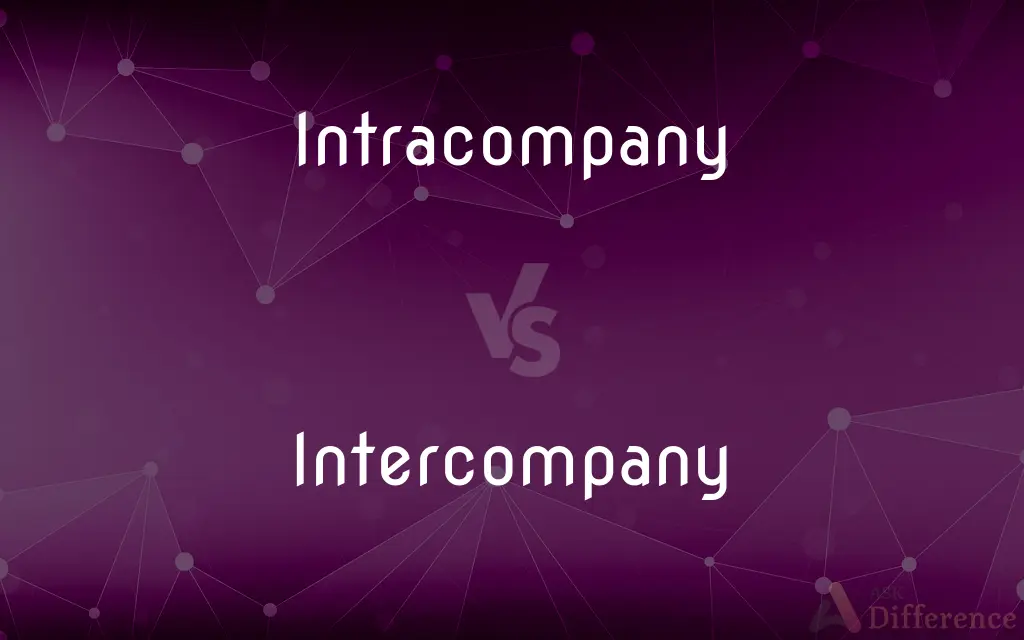Intracompany vs. Intercompany — What's the Difference?
By Urooj Arif & Fiza Rafique — Updated on February 24, 2024
Intracompany refers to activities within a single company, focusing on internal operations, while intercompany involves interactions between separate, distinct companies, highlighting external relations.

Difference Between Intracompany and Intercompany
Table of Contents
ADVERTISEMENT
Key Differences
Intracompany activities are confined within the boundaries of one company, focusing on internal transactions, policies, and communications. Intercompany, on the other hand, pertains to transactions and interactions that occur between two or more distinct entities. This can involve trade agreements, partnerships, or financial transactions that require coordination and negotiation between separate companies, often with the goal of expanding business opportunities or sharing resources.
Intracompany activities might include transfers of goods, services, or funds between departments or divisions of the same entity, aiming to streamline operations and improve efficiency. Intracompany operations are crucial for maintaining the internal coherence and efficiency of a business, intercompany relationships are essential for fostering growth, innovation, and competitive advantage by leveraging external partnerships and market opportunities.
The distinction also affects financial reporting and taxation. Intracompany transactions may need to be consolidated or eliminated in financial statements to present a unified financial position, whereas intercompany transactions must be carefully documented and may be subject to different tax regulations, depending on the jurisdictions of the companies involved.
The management strategies for intracompany and intercompany activities differ significantly. Intracompany management focuses on optimizing internal processes and aligning the goals of different departments, while intercompany management requires negotiation, collaboration, and sometimes complex legal agreements between independent entities.
Comparison Chart
Scope
Activities within a single company.
Transactions between separate companies.
ADVERTISEMENT
Focus
Internal operations, efficiency, and policy implementation.
External relations, partnerships, and market expansion.
Financial Reporting
Transactions may be consolidated or eliminated in reporting.
Must be carefully documented, affecting financial statements.
Tax Implications
Generally internal and not subject to external taxation.
Subject to tax regulations, possibly in multiple jurisdictions.
Management Strategy
Aims at internal optimization and coherence.
Involves negotiation and legal agreements between entities.
Compare with Definitions
Intracompany
Focuses on internal efficiency.
Intracompany communications were improved to enhance productivity.
Intercompany
Requires careful financial documentation.
Intercompany loans were meticulously recorded for tax purposes.
Intracompany
Pertaining to activities within a single company.
The intracompany transfer of goods between departments streamlined operations.
Intercompany
Focuses on external partnerships.
Intercompany negotiations led to a lucrative trade deal.
Intracompany
Targets operational coherence.
Intracompany trainings aimed to align departmental objectives.
Intercompany
Involves transactions between distinct companies.
The intercompany agreement facilitated mutual market expansion.
Intracompany
Involves internal policies.
The CEO announced a new intracompany policy for remote work.
Intercompany
Pertains to market competition.
Intercompany collaborations introduced innovative products.
Intracompany
Occurring within or between the branches of a company
An intracompany network.
Intercompany
Aims at leveraging external resources.
An intercompany initiative pooled R&D resources for breakthroughs.
Intracompany
Occurring within a company, often especially as between its divisions or departments.
Intercompany
Between, or involving, different companies
Intracompany
Affects internal reporting.
Intracompany transactions were consolidated for the annual report.
Common Curiosities
What is intracompany?
Intracompany refers to activities, transactions, or policies that occur within a single company, focusing on internal operations.
What is intercompany?
Intercompany pertains to interactions, transactions, or agreements between two or more separate companies.
Can intracompany transactions affect tax liabilities?
Generally, intracompany transactions are internal and don't directly affect taxes, but they must be properly managed and documented for overall financial accuracy.
Why are intercompany transactions significant?
They are crucial for business expansion, partnerships, and accessing new markets, requiring detailed documentation for legal and tax purposes.
What management strategies are used for intracompany activities?
Strategies focus on improving internal efficiency, coherence, and aligning departmental goals within the company.
How do companies manage intercompany relationships?
Through negotiation, collaboration, and legal agreements to ensure mutual benefits and compliance with regulations.
How do intracompany activities impact financial reporting?
Intracompany transactions may need to be consolidated or eliminated in financial statements to accurately reflect the company's financial status.
Are intracompany transactions the same as internal transactions?
Yes, intracompany transactions are internal, occurring within the same company, often between departments or divisions.
How do intracompany and intercompany activities differ in terms of focus?
Intracompany activities focus on internal optimization, while intercompany activities aim at external growth and partnerships.
Why is detailed documentation important for intercompany transactions?
To ensure legal compliance, accurate tax reporting, and clear financial statements, especially in cross-border dealings.
What challenges do intercompany transactions pose?
They can involve complex legal and tax considerations, especially when crossing international borders.
Can a transaction be both intracompany and intercompany?
No, a transaction cannot be both; it's either within the same company (intracompany) or between different companies (intercompany).
Can intracompany practices influence a company's culture?
Yes, they play a significant role in shaping the company's internal culture, communication, and operational efficiency.
Do intercompany transactions require external approval?
Depending on the nature and scale, they may require regulatory approval or adherence to specific legal frameworks.
How do intracompany and intercompany transactions impact consolidation?
Intracompany transactions are often eliminated in consolidation to prevent double counting, while intercompany transactions must be accurately represented in consolidated financial statements.
Share Your Discovery

Previous Comparison
Association vs. Federation
Next Comparison
Battlements vs. BartisanAuthor Spotlight
Written by
Urooj ArifUrooj is a skilled content writer at Ask Difference, known for her exceptional ability to simplify complex topics into engaging and informative content. With a passion for research and a flair for clear, concise writing, she consistently delivers articles that resonate with our diverse audience.
Co-written by
Fiza RafiqueFiza Rafique is a skilled content writer at AskDifference.com, where she meticulously refines and enhances written pieces. Drawing from her vast editorial expertise, Fiza ensures clarity, accuracy, and precision in every article. Passionate about language, she continually seeks to elevate the quality of content for readers worldwide.















































